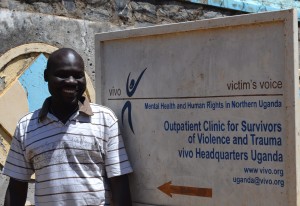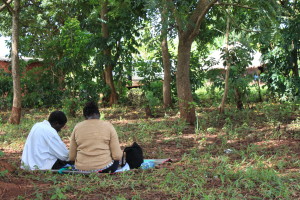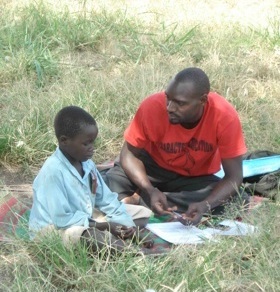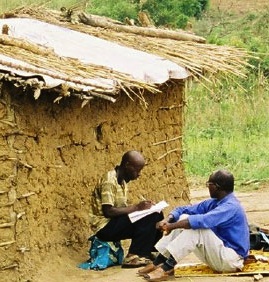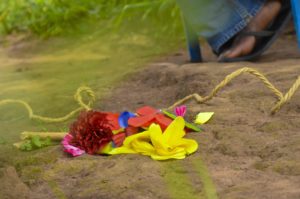
Together with Ugandan vivo employees, our long-standing partner Omoana has produced a short video that explains trauma therapy in Uganda very well.
You can watch the video under this link.
Uganda
Video on vivo’s work in Uganda

Together with Ugandan vivo employees, our long-standing partner Omoana has produced a short video that explains trauma therapy in Uganda very well.
You can watch the video under this link.
Understanding and Overcoming Conflicts
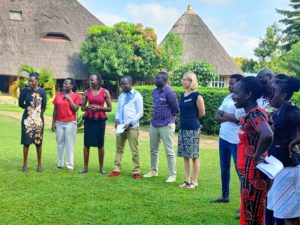
In August, the vivo counselling team in Gulu, Uganda participated in a two-day training course facilitated by Wibke Angelike, a trainer and mediator of non-violent conflict resolution working for the German Civil Peace Service in cooperation with the Justice and Peace Department of the Gulu Archdiocese. Lesen Sie weiter: Understanding and Overcoming Conflicts

In August, the vivo counselling team in Gulu, Uganda participated in a two-day training course facilitated by Wibke Angelike, a trainer and mediator of non-violent conflict resolution working for the German Civil Peace Service in cooperation with the Justice and Peace Department of the Gulu Archdiocese. Continue reading: Understanding and Overcoming Conflicts
Setting a sign against alcohol abuse
vivo counsellors have been providing trauma-therapy in war-affected communities of Northern Uganda since 2007 mostly for severely traumatised formerly abducted children now grown into young adults with their own families. For a long time vivo counsellors had realised the vast need for also an alcohol intervention, when meeting women and children affected by domestic violence that is often linked to male alcohol consumption.

vivo counsellors have been providing trauma-therapy in war-affected communities of Northern Uganda since 2007 mostly for severely traumatised formerly abducted children now grown into young adults with their own families. For a long time vivo counsellors had realised the vast need for also an alcohol intervention, when meeting women and children affected by domestic violence that is often linked to male alcohol consumption.

Findings on Narrative Exposure Therapy
Schneider, A., Pfeiffer, A., Conrad, D., Elbert, T., Kolassa, I.-T., Wilker, S. (2020).
Does cumulative exposure to traumatic stressors predict treatment outcome of community-implemented exposure-based therapy for PTSD?
European Journal of Psychotraumatology, 11:1, 1789323
Siehl, S., Robjant, K., Crombach, A. (2020).
Systematic review and meta-analyses of the long-term efficacy of narrative exposure therapy for adults, children and perpetrators
Psychotherapy Research
Schneider, A., Pfeiffer, A., Conrad, D., Elbert, T., Kolassa, I.-T., Wilker, S. (2020).
Does cumulative exposure to traumatic stressors predict treatment outcome of community-implemented exposure-based therapy for PTSD?
European Journal of Psychotraumatology, 11:1, 1789323
Siehl, S., Robjant, K., Crombach, A. (2020).
Systematic review and meta-analyses of the long-term efficacy of narrative exposure therapy for adults, children and perpetrators
Psychotherapy Research
vivos work during the corona pademic
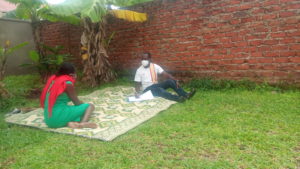
On our Facebook page we report what the COVID-19 pandemic has changed in different projects.
Read all articles at
https://www.facebook.com/vivokonstanz/

On our Facebook page we report what the COVID-19 pandemic has changed in different projects.
Read all articles at
https://www.facebook.com/vivokonstanz/
News from Gulu
New therapists for Uganda and supoort from Germany
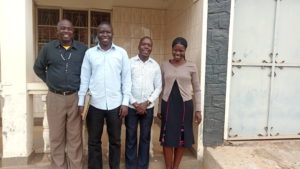
In February 2020 the vivo outpatient clinic in Gulu, Northern Uganda planned to recruit four new staff members. Therefore we trained eight candidates in the theoretical background and practical application of Narrative Exposure Therapy (NET). The training was supported by vivo member Dr. Ulrike Amann on her fourth yearly volunteer work-visit to the Gulu outpatient clinic.
New therapists for Uganda and supoort from Germany

In February 2020 the vivo outpatient clinic in Gulu, Northern Uganda planned to recruit four new staff members. Therefore we trained eight candidates in the theoretical background and practical application of Narrative Exposure Therapy (NET). The training was supported by vivo member Dr. Ulrike Amann on her fourth yearly volunteer work-visit to the Gulu outpatient clinic.
News from Gulu
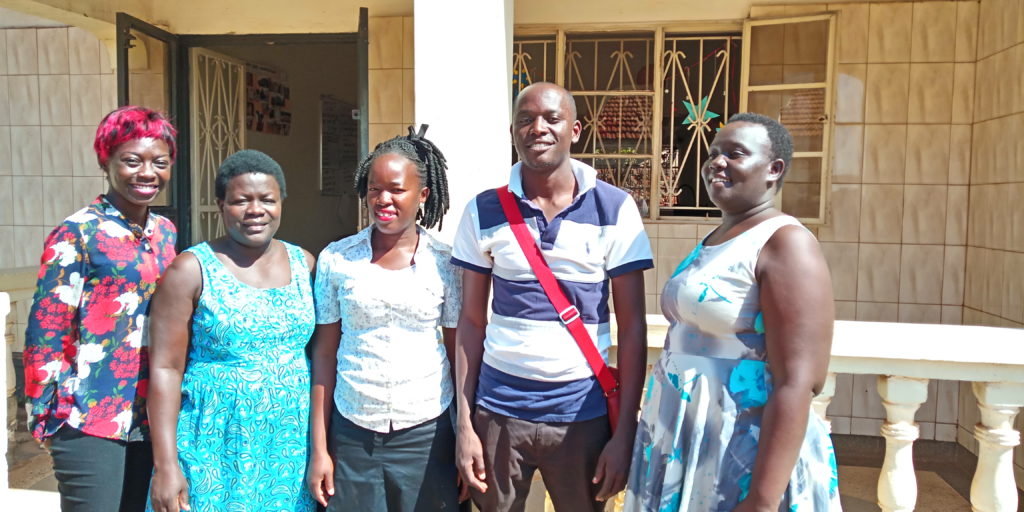
Training of new counsellors in January and February 2019 completed
Our 6 newly employed counsellors are joining our existing team of 15 senior counsellors. They are all lay personnel, having work experience and education only in non-psychological fields – but all completed successfully an intense practical and theoretical training and were chosen among 10 trainees and originally 40 applicants in total. Currently they are joining the senior counsellors in their treatment sessions in order to have a more intense on-the-job learning period before they will soon start their own treatments with highly traumatised clients by war, forceful abductions and torture.

Training of new counsellors in January and February 2019 completed
Our 6 newly employed counsellors are joining our existing team of 15 senior counsellors. They are all lay personnel, having work experience and education only in non-psychological fields – but all completed successfully an intense practical and theoretical training and were chosen among 10 trainees and originally 40 applicants in total. Currently they are joining the senior counsellors in their treatment sessions in order to have a more intense on-the-job learning period before they will soon start their own treatments with highly traumatised clients by war, forceful abductions and torture.
Exchange workshop in Rwanda
In September 2017 vivo was invited to participate in a one-week exchange workshop in Huye, Rwanda between different organisations working with persons affected by violence in (post-)conflict region of Eastern Africa, specifically in Northern Uganda, Rwanda and Eastern DRCongo.
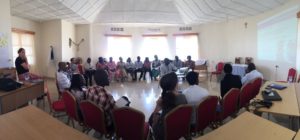
10-year-anniversary of vivo NET counsellors in Northern Uganda
It is an overused expression, but it really feels like “time is flying” – yes, it has been already 10 years that vivo international trained their first local lay personnel in Northern Uganda to provide NET treatment for traumatised survivors of violence and torture.
So this year we are celebrating the 10-year-anniversary of 7 senior counsellors working for vivo international in Northern Uganda.
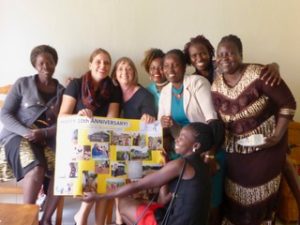
Lesen Sie weiter: 10-year-anniversary of vivo NET counsellors in Northern Uganda
It is an overused expression, but it really feels like “time is flying” – yes, it has been already 10 years that vivo international trained their first local lay personnel in Northern Uganda to provide NET treatment for traumatised survivors of violence and torture.
So this year we are celebrating the 10-year-anniversary of 7 senior counsellors working for vivo international in Northern Uganda.

Continue reading: 10-year-anniversary of vivo NET counsellors in Northern Uganda
Impressions from vivo’s outpatient clinic in Northern Uganda
In 2017 the vivo outpatient clinic in Gulu, Northern Uganda, is still successful and impressing us with their work.
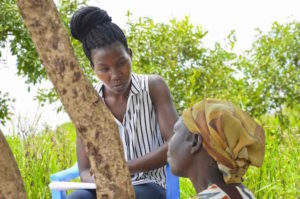
Lesen Sie weiter: Impressions from vivo’s outpatient clinic in Northern Uganda
In 2017 the vivo outpatient clinic in Gulu, Northern Uganda, is still successful and impressing us with their work.

Continue reading: Impressions from vivo’s outpatient clinic in Northern Uganda
Posttraumatic stress in war-affected youth
Winkler, N., Ruf-Leuschner, M., Ertl, V., Pfeiffer, A., Schalinski, I., Ovuga, E., Neuner, F., Elbert, T. (2015).
From war to classroom: PTSD and depression in formerly abducted youth in Uganda.
Frontiers in Psychiatry, 6, 2.
Winkler, N., Ruf-Leuschner, M., Ertl, V., Pfeiffer, A., Schalinski, I., Ovuga, E., Neuner, F., Elbert, T. (2015).
From war to classroom: PTSD and depression in formerly abducted youth in Uganda.
Frontiers in Psychiatry, 6, 2.
Family violence and trauma
Catani, C., Sossalla, I. (2015).
Child abuse predicts adult PTSD symptoms among individuals diagnosed with intellectual disabilities.
Frontiers in Psychology, 6:1600.
Crombach, A., Bambonyé, M. (2015).
Intergenerational violence in Burundi: Experienced childhood maltreatment increases the risk of abusive child rearing and intimate partner violence.
European Journal of Psychotraumatology, 6:26995.
Saile, R., Ertl, V., Neuner, F., Catani, C. (2015).
Children of the postwar years: A two-generational multilevel risk assessment of child psychopathology in northern Uganda.
Development and Psychopathology.
Sriskandarajah, V., Neuner, F., Catani, C. (2015).
Predictors of Violence Against Children in Tamil Families in Northern Sri Lanka.
Social Science and Medicine, 146:257-265.
Catani, C., Sossalla, I. (2015).
Child abuse predicts adult PTSD symptoms among individuals diagnosed with intellectual disabilities.
Frontiers in Psychology, 6:1600.
Crombach, A., Bambonyé, M. (2015).
Intergenerational violence in Burundi: Experienced childhood maltreatment increases the risk of abusive child rearing and intimate partner violence.
European Journal of Psychotraumatology, 6:26995.
Saile, R., Ertl, V., Neuner, F., Catani, C. (2015).
Children of the postwar years: A two-generational multilevel risk assessment of child psychopathology in northern Uganda.
Development and Psychopathology.
Sriskandarajah, V., Neuner, F., Catani, C. (2015).
Predictors of Violence Against Children in Tamil Families in Northern Sri Lanka.
Social Science and Medicine, 146:257-265.
Assembly on mental health in Gulu
10 Years Anniversary of vivo in Northern Uganda!
vivo international is looking back on 10 years of providing and improving mental health services in Northern Uganda. We are using this occasion to host a general assembly on mental health in Gulu on the 20th of October 2015. We will discuss and share accomplishments, challenges and visions with our cooperating partners, practitioners, researchers and scholars. Please click here for the invitation details.
10 Years Anniversary of vivo in Northern Uganda!
vivo international is looking back on 10 years of providing and improving mental health services in Northern Uganda. We are using this occasion to host a general assembly on mental health in Gulu on the 20th of October 2015. We will discuss and share accomplishments, challenges and visions with our cooperating partners, practitioners, researchers and scholars. Please click here for the invitation details.
Interventions focusing on caregiving
Hermenau, K., Kaltenbach, E., Mkinga, G., & Hecker, T. (2015).
Improving care quality and preventing maltreatment in institutional care – a feasibility study with caregivers.
Frontiers in Psychology, 6, 937.
Wieling, E., Mehus, C., Möllerherm, J., Neuner, F., Laura, A., Catani, C.(2015).
Assessing the Feasibility of Providing a Parenting Intervention for War-Affected Families in Northern Uganda.
Fam Community Health, 38(3), pp. 253–268.
Hermenau, K., Kaltenbach, E., Mkinga, G., & Hecker, T. (2015).
Improving care quality and preventing maltreatment in institutional care – a feasibility study with caregivers.
Frontiers in Psychology, 6, 937.
Wieling, E., Mehus, C., Möllerherm, J., Neuner, F., Laura, A., Catani, C.(2015).
Assessing the Feasibility of Providing a Parenting Intervention for War-Affected Families in Northern Uganda.
Fam Community Health, 38(3), pp. 253–268.
Recent studies about NET
Ertl, V., Pfeiffer, A., Schauer, E., Elbert T, Neuner, F. (2011).
Community-implemented trauma therapy for former child soldiers in Northern Uganda: a randomized controlled trial.
JAMA, 306(5), 503-12.
Jacob, N., Neuner, F., Mädl, A., Schaal, S., & Elbert, T. (2014).
Dissemination of psychotherapy for trauma-spectrum disorders in resource-poor countries: a randomized controlled trial in Rwanda.
Psychotherapy & Psychosomatics.
Pabst, A., Schauer, M., Bernhardt, K., Ruf, M., Goder, R., Rosentraeger, R., Elbert, T., Aldenhoff, J. & Seeck-Hirschner, M. (2012).
Treatment of patients with borderline personality disorder and comorbid posttraumatic stress disorder using Narrative Exposure Therapy: a feasibility study.
Psychotherapy and Psychosomatics, 81, 61-63.
Robjant, K. & Fazel, M. (2010).
The emerging evidence for Narrative Exposure Therapy: a review.
Clin Psychol Reviews, 30, 8,1030-9.
Stenmark, H., Catani, C., Neuner, F., Elbert, T., & Holen, A. (2013).
Treating PTSD in refugees and asylum seekers within the general health care system. A randomized controlled multicenter study.
Behaviour research and therapy, Vol 51(10), 641-647.
Ertl, V., Pfeiffer, A., Schauer, E., Elbert T, Neuner, F. (2011).
Community-implemented trauma therapy for former child soldiers in Northern Uganda: a randomized controlled trial.
JAMA, 306(5), 503-12.
Jacob, N., Neuner, F., Mädl, A., Schaal, S., & Elbert, T. (2014).
Dissemination of psychotherapy for trauma-spectrum disorders in resource-poor countries: a randomized controlled trial in Rwanda.
Psychotherapy & Psychosomatics.
Pabst, A., Schauer, M., Bernhardt, K., Ruf, M., Goder, R., Rosentraeger, R., Elbert, T., Aldenhoff, J. & Seeck-Hirschner, M. (2012).
Treatment of patients with borderline personality disorder and comorbid posttraumatic stress disorder using Narrative Exposure Therapy: a feasibility study.
Psychotherapy and Psychosomatics, 81, 61-63.
Robjant, K. & Fazel, M. (2010).
The emerging evidence for Narrative Exposure Therapy: a review.
Clin Psychol Reviews, 30, 8,1030-9.
Stenmark, H., Catani, C., Neuner, F., Elbert, T., & Holen, A. (2013).
Treating PTSD in refugees and asylum seekers within the general health care system. A randomized controlled multicenter study.
Behaviour research and therapy, Vol 51(10), 641-647.
Further articles on NET
Bichescu, D., Neuner, F., Schauer, M., Elbert, T. (2007).
Narrative Exposure therapy of political imprisonment-related chronic posttraumatic stress disorder and depression.
Behaviour Research and Therapy , 45(9), 2212-20.
Neuner, F., Catani, C., Ruf, M., Schauer, E., Schauer, M. & Elbert, T. (2008).
Narrative Exposure Therapy for the treatment of child and adolescent war victims: From neurobiology to field intervention.
Child and Adolescent Psychiatric Clinics of North America, 17, 641-664.
Neuner, F., Onyut, P., Ertl. V., Schauer, E., Odenwald, M. & Elbert, T. (2008).
Treatment of posttraumatic stress disorder by trained lay counsellors in an African refugee settlement – a randomized controlled trial.
Journal of Consulting and Clinical Psychology, 76, 686-694.
Onyut, P.L., Neuner F., Schauer E., Ertl V., Odenwald, M., Schauer, M., Elbert T. (2005).
Narrative Exposure Therapy as a treatment for child war survivors with posttraumatic stress disorder: Two case reports and a pilot study in an African refugee settlement.
BMC Psychiatry, 5:7.
Bichescu, D., Neuner, F., Schauer, M., Elbert, T. (2007).
Narrative Exposure therapy of political imprisonment-related chronic posttraumatic stress disorder and depression.
Behaviour Research and Therapy , 45(9), 2212-20.
Neuner, F., Catani, C., Ruf, M., Schauer, E., Schauer, M. & Elbert, T. (2008).
Narrative Exposure Therapy for the treatment of child and adolescent war victims: From neurobiology to field intervention.
Child and Adolescent Psychiatric Clinics of North America, 17, 641-664.
Neuner, F., Onyut, P., Ertl. V., Schauer, E., Odenwald, M. & Elbert, T. (2008).
Treatment of posttraumatic stress disorder by trained lay counsellors in an African refugee settlement – a randomized controlled trial.
Journal of Consulting and Clinical Psychology, 76, 686-694.
Onyut, P.L., Neuner F., Schauer E., Ertl V., Odenwald, M., Schauer, M., Elbert T. (2005).
Narrative Exposure Therapy as a treatment for child war survivors with posttraumatic stress disorder: Two case reports and a pilot study in an African refugee settlement.
BMC Psychiatry, 5:7.
Findings on post-traumatic stress
Elbert T., Schauer, M. (2002).
Psychological trauma: Burnt into memory.
Nature, 419, 883.
Karunakara, U., Neuner, F., Schauer, M., Singh, K., Hill, K., Elbert, T., Burnham G. (2004).
Traumatic Events and Symptoms of Post-traumatic Stress Disorder amongst Sudanese nationals, refugees and Ugandan nationals in the West Nile.
African Health Sciences, 4(2), 83-93.
Neuner, F., Schauer, M., Karunakara, U., Klaschik, C., Robert C., Elbert, T. (2004).
Psychological trauma and evidence for enhanced vulnerability for PTSD through previous trauma in West Nile refugees.
BMC Psychiatry, 4: 34.
Onyut, P.L., Neuner F., Schauer E., Ertl V., Odenwald, M., Schauer, M., Elbert T. (2004).
The Nakivale Camp Mental Health Project: Building local competency for psychological assistance to traumatised refugees.
Intervention,2 (2), 90-107.
Elbert T., Schauer, M. (2002).
Psychological trauma: Burnt into memory.
Nature, 419, 883.
Karunakara, U., Neuner, F., Schauer, M., Singh, K., Hill, K., Elbert, T., Burnham G. (2004).
Traumatic Events and Symptoms of Post-traumatic Stress Disorder amongst Sudanese nationals, refugees and Ugandan nationals in the West Nile.
African Health Sciences, 4(2), 83-93.
Neuner, F., Schauer, M., Karunakara, U., Klaschik, C., Robert C., Elbert, T. (2004).
Psychological trauma and evidence for enhanced vulnerability for PTSD through previous trauma in West Nile refugees.
BMC Psychiatry, 4: 34.
Onyut, P.L., Neuner F., Schauer E., Ertl V., Odenwald, M., Schauer, M., Elbert T. (2004).
The Nakivale Camp Mental Health Project: Building local competency for psychological assistance to traumatised refugees.
Intervention,2 (2), 90-107.
Facts and Numbers for the „vivo outpatient clinic for survivors of violence and trauma“ in Gulu
Since April 2011 the vivo outpatient clinic in Gulu, Northern Uganda is a steady service provider for the rehabilitation of chronic trauma-related mental health problems of survivors of violence and trauma during the war and in the post-conflict society.
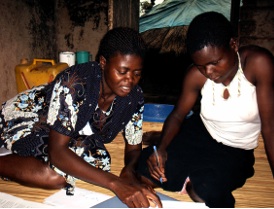
vivo’s vision in Uganda
vivo provides evidence-based psychological treatment to the most vulnerable. Through interventions on the individual and systemic level vivo works to stop violence and enable peace. Watch vivo staff members Anett Pfeiffer and Laura Achan say more about vivo’s vision in Uganda (filmed and edited by Helle Harnisch).
vivo provides evidence-based psychological treatment to the most vulnerable. Through interventions on the individual and systemic level vivo works to stop violence and enable peace. Watch vivo staff members Anett Pfeiffer and Laura Achan say more about vivo’s vision in Uganda (filmed and edited by Helle Harnisch).
Our work in Gulu Prison
Since October 2012 vivo is also working in the prison of Gulu. The approximately 700 male inmates and approx. 300 female inmates are also often formerly abducted by the LRA and suffer as well from Posttraumatic Stress Disorder. The mental health well-being of the inmates is also influenced by the long pre-trial detention times (Uganda has too little personnel, e.g. only a few judges responsible for capital offences) and the general poverty: the inmates are dependent on their relatives to provide for food and legal fees.
Since October 2012 vivo is also working in the prison of Gulu. The approximately 700 male inmates and approx. 300 female inmates are also often formerly abducted by the LRA and suffer as well from Posttraumatic Stress Disorder. The mental health well-being of the inmates is also influenced by the long pre-trial detention times (Uganda has too little personnel, e.g. only a few judges responsible for capital offences) and the general poverty: the inmates are dependent on their relatives to provide for food and legal fees.
Psychosocial support for survivors of gender-based violence
In our work in Northern Uganda, vivo recorded alarmingly high rates of acts of gender-based violence: More than 80% of the female clients who had received trauma-focused treatments through vivo reported at least one sexual assault during their lifetime. Some of these traumatic sexual experiences took place during the war, but even in the post-conflict society sexual assaults towards women and children are on the rise. To provide psychotherapeutic support to survivors of gender-based violence, vivo was funded by the UN (namely the UN Peace Building Fund via UNFPA) in the framework of the project “Strengthening the Multisectoral Approach to Gender-Based Violence Prevention and Response” from April 2011 until June 2012. In the course of this project, vivo offered a wide range of psychological support for traumatised children and women, which included psychodiagnostic assessments, trauma-focused therapy, solution-focused and resource-oriented counselling, family mediation and follow-up visits.
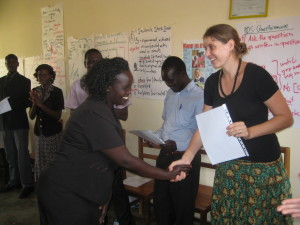
Lesen Sie weiter: Psychosocial support for survivors of gender-based violence
In our work in Northern Uganda, vivo recorded alarmingly high rates of acts of gender-based violence: More than 80% of the female clients who had received trauma-focused treatments through vivo reported at least one sexual assault during their lifetime. Some of these traumatic sexual experiences took place during the war, but even in the post-conflict society sexual assaults towards women and children are on the rise. To provide psychotherapeutic support to survivors of gender-based violence, vivo was funded by the UN (namely the UN Peace Building Fund via UNFPA) in the framework of the project “Strengthening the Multisectoral Approach to Gender-Based Violence Prevention and Response” from April 2011 until June 2012. In the course of this project, vivo offered a wide range of psychological support for traumatised children and women, which included psychodiagnostic assessments, trauma-focused therapy, solution-focused and resource-oriented counselling, family mediation and follow-up visits.

Continue reading: Psychosocial support for survivors of gender-based violence
Establishment of a trauma-focused outpatient clinic for Northern Uganda
Since 1986 there has been an unrelenting and brutal war in the Northern districts of Uganda, led by the rebel group called the “Lord’s Resistance Army”. Studies by vivo have repeatedly shown that the psychological consequences of these two decades of war and terror are still ongoing: Despite the fact that the fighting ended in 2005, many survivors cannot forget their experiences and continuously relive them in the form of intruding memories, nightmares and flashbacks. For them, the war continues in their minds. Furthermore, this long-lasting war has shattered social norms of non-violent interactions, which manifests in severe cases of violence within families and communities and thus leads to further traumatization.
Lesen Sie weiter: Establishment of a trauma-focused outpatient clinic for Northern Uganda
Since 1986 there has been an unrelenting and brutal war in the Northern districts of Uganda, led by the rebel group called the “Lord’s Resistance Army”. Studies by vivo have repeatedly shown that the psychological consequences of these two decades of war and terror are still ongoing: Despite the fact that the fighting ended in 2005, many survivors cannot forget their experiences and continuously relive them in the form of intruding memories, nightmares and flashbacks. For them, the war continues in their minds. Furthermore, this long-lasting war has shattered social norms of non-violent interactions, which manifests in severe cases of violence within families and communities and thus leads to further traumatization.
Continue reading: Establishment of a trauma-focused outpatient clinic for Northern Uganda
Violence in the family: Support for affected families in Northern Uganda
Beyond the grievous consequences of war for the individual, exposure to violence on a societal level profoundly disrupts the family system. Loss of family members, psychological suffering of individual family members, high rates of alcohol abuse and the detachment from traditional social support systems such as the extended family adversely affect family relationships. As a consequence families that
have been living through war are at a high risk for family violence even after the war has ended. Children growing up with violence in the family continue to suffer and are vulnerable to develop long-lasting emotional and behavioural problems.
Lesen Sie weiter: Violence in the family: Support for affected families in Northern Uganda
Beyond the grievous consequences of war for the individual, exposure to violence on a societal level profoundly disrupts the family system. Loss of family members, psychological suffering of individual family members, high rates of alcohol abuse and the detachment from traditional social support systems such as the extended family adversely affect family relationships. As a consequence families that
have been living through war are at a high risk for family violence even after the war has ended. Children growing up with violence in the family continue to suffer and are vulnerable to develop long-lasting emotional and behavioural problems.
Continue reading: Violence in the family: Support for affected families in Northern Uganda
Psychosocial support system for 600 youths in Northern Uganda
In close collaboration with the Norwegian Refugee Council’s Youth Education Pack (YEP), vivo started up the development of a long-term psychosocial support system which has so far reached 600 war-affected youths in vocational training centres all over Uganda’s war-torn North. YEP supports most severely affected learners, many of them formerly abducted child soldiers, within ten vocational trainings centres. Within the YEP program learners are enabled to learn practical vocational skills and catch up on academic education in order to reintegrate better within their communities after their return home.
Lesen Sie weiter: Psychosocial support system for 600 youths in Northern Uganda
In close collaboration with the Norwegian Refugee Council’s Youth Education Pack (YEP), vivo started up the development of a long-term psychosocial support system which has so far reached 600 war-affected youths in vocational training centres all over Uganda’s war-torn North. YEP supports most severely affected learners, many of them formerly abducted child soldiers, within ten vocational trainings centres. Within the YEP program learners are enabled to learn practical vocational skills and catch up on academic education in order to reintegrate better within their communities after their return home.
Continue reading: Psychosocial support system for 600 youths in Northern Uganda
Founding and current work of vivo Uganda
vivo decided to build a permanent base in the country in 2004. Local cooperation partners and team members formed vivo Uganda, the independent sister organization of vivo, which is registered with the country’s NGO board. With vivo becoming more and more visible in Uganda, local policy makers and officials requested vivo to not only focus on refugees, but engage in helping the war-affected and displaced population of Northern Uganda.
vivo decided to build a permanent base in the country in 2004. Local cooperation partners and team members formed vivo Uganda, the independent sister organization of vivo, which is registered with the country’s NGO board. With vivo becoming more and more visible in Uganda, local policy makers and officials requested vivo to not only focus on refugees, but engage in helping the war-affected and displaced population of Northern Uganda.
Planning workshop for DDR programs in Switzerland
In May 2010 vivo was invited by the United Nations Development Program (UNDP) and the Norwegian Defence University College (NODEFIC) to share its expertise to plan a training for gender-sensitive Demobilization, Disarmament and Reintegration Programmes (DDR).
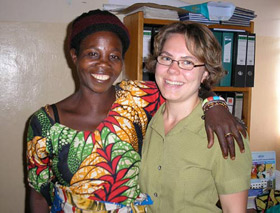
Lesen Sie weiter: Planning workshop for DDR programs in Switzerland
In May 2010 vivo was invited by the United Nations Development Program (UNDP) and the Norwegian Defence University College (NODEFIC) to share its expertise to plan a training for gender-sensitive Demobilization, Disarmament and Reintegration Programmes (DDR).

Continue reading: Planning workshop for DDR programs in Switzerland
vivo’s initial steps in Uganda
Uganda has a long history of civil wars and has been surrounded by some of the worst conflicts in African history. As a consequence, Uganda hosts large refugee populations from many foreign countries and has to deal with the legacy of their own wars. vivo’s work in Uganda started in 1999 with the first trial of Narrative Exposure Therapy (NET) treating traumatized Sudanese refugees in Imvepi refugee camp situated in the very North of Uganda.
Uganda has a long history of civil wars and has been surrounded by some of the worst conflicts in African history. As a consequence, Uganda hosts large refugee populations from many foreign countries and has to deal with the legacy of their own wars. vivo’s work in Uganda started in 1999 with the first trial of Narrative Exposure Therapy (NET) treating traumatized Sudanese refugees in Imvepi refugee camp situated in the very North of Uganda.


